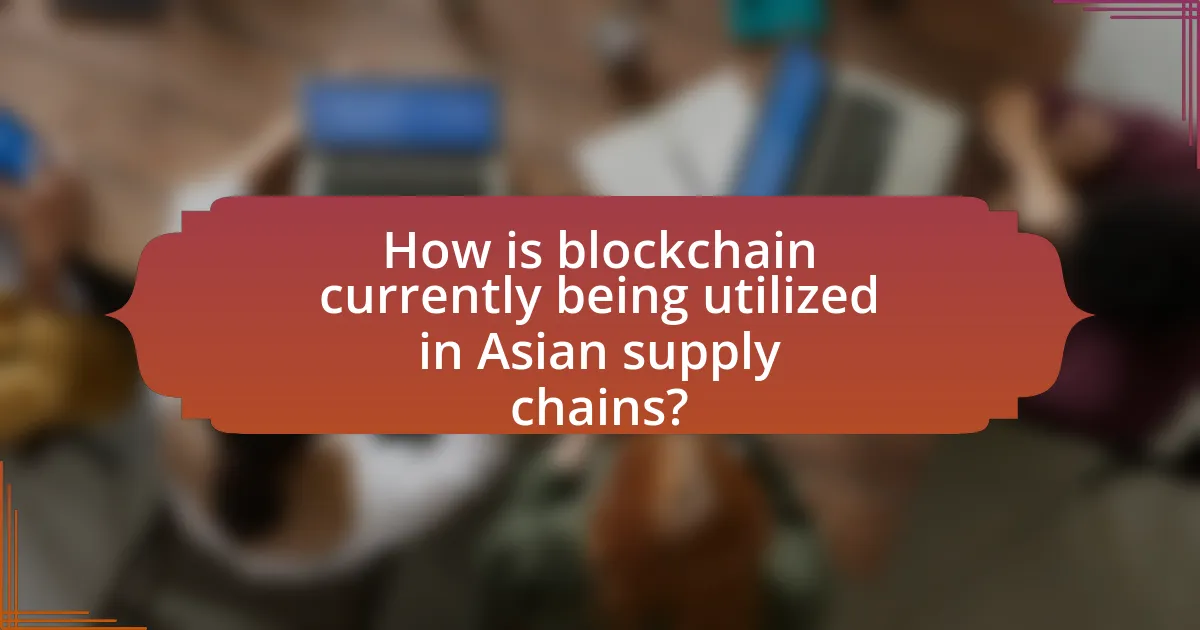Blockchain applications in Asian supply chain management are transforming the industry by enhancing transparency, traceability, and efficiency. Major companies like Alibaba and Walmart are utilizing blockchain technology to track the provenance of products, ensuring safety and quality while reducing supply chain costs by up to 20%. The technology’s decentralized and immutable ledger allows real-time data sharing among stakeholders, mitigating fraud and errors. Key benefits include improved inventory management, faster transaction times, and increased customer satisfaction, as consumers gain access to verified product information. The article also explores the challenges faced by Asian supply chains, successful case studies, and future trends in blockchain adoption across various industries.

What are Blockchain Applications in Asian Supply Chain Management?
Blockchain applications in Asian supply chain management include enhancing transparency, improving traceability, and increasing efficiency. For instance, companies like Alibaba and Walmart have implemented blockchain to track the provenance of food products, ensuring safety and quality by allowing consumers to trace the journey of their food from farm to table. Additionally, blockchain facilitates real-time data sharing among stakeholders, reducing delays and errors in transactions. According to a report by the World Economic Forum, blockchain could reduce supply chain costs by up to 20% by streamlining processes and minimizing fraud.
How does blockchain technology enhance supply chain processes in Asia?
Blockchain technology enhances supply chain processes in Asia by providing increased transparency, traceability, and efficiency. This technology allows all parties involved in the supply chain to access a shared, immutable ledger, which reduces the risk of fraud and errors. For instance, a study by the World Economic Forum highlighted that blockchain can reduce supply chain costs by up to 20% through improved inventory management and reduced paperwork. Additionally, companies like Walmart and Alibaba have implemented blockchain solutions to track the provenance of goods, ensuring quality and compliance with regulations. This capability not only builds consumer trust but also streamlines operations, ultimately leading to faster delivery times and reduced operational costs.
What specific features of blockchain contribute to supply chain efficiency?
Blockchain enhances supply chain efficiency through features such as transparency, traceability, and immutability. Transparency allows all parties in the supply chain to access real-time data, reducing information asymmetry and fostering trust. Traceability enables the tracking of products from origin to destination, which helps in identifying bottlenecks and ensuring compliance with regulations. Immutability ensures that once data is recorded on the blockchain, it cannot be altered, which prevents fraud and errors. These features collectively streamline operations, reduce costs, and improve decision-making in supply chain management.
How does blockchain improve transparency in Asian supply chains?
Blockchain enhances transparency in Asian supply chains by providing a decentralized and immutable ledger that records every transaction in real-time. This technology allows all stakeholders, including manufacturers, suppliers, and consumers, to access the same information, thereby reducing information asymmetry. For instance, a study by the World Economic Forum in 2020 highlighted that blockchain can track the provenance of goods, ensuring that all parties can verify the authenticity and origin of products. This capability not only builds trust among participants but also helps in identifying inefficiencies and fraud, ultimately leading to a more transparent and accountable supply chain.
What challenges do Asian supply chains face that blockchain can address?
Asian supply chains face challenges such as lack of transparency, inefficiencies in tracking goods, and vulnerability to fraud, which blockchain technology can effectively address. Blockchain enhances transparency by providing a decentralized ledger that allows all parties to access real-time data, thereby reducing information asymmetry. Additionally, it improves tracking through immutable records of transactions, enabling better inventory management and reducing delays. Furthermore, blockchain’s cryptographic security features mitigate fraud risks by ensuring that data cannot be altered without consensus from all stakeholders. These capabilities are crucial in the context of Asian supply chains, which often involve multiple parties and complex logistics networks.
How does blockchain mitigate issues related to fraud in supply chains?
Blockchain mitigates issues related to fraud in supply chains by providing a decentralized and immutable ledger that enhances transparency and traceability. This technology allows all participants in the supply chain to access the same information in real-time, reducing the likelihood of data manipulation. For instance, a study by the World Economic Forum highlights that blockchain can reduce fraud by up to 50% in supply chains by ensuring that every transaction is recorded and verified by multiple parties. This verification process creates a reliable audit trail, making it difficult for fraudulent activities to go unnoticed.
What role does blockchain play in improving traceability of products?
Blockchain enhances product traceability by providing a decentralized and immutable ledger that records every transaction in the supply chain. This technology allows all stakeholders, including manufacturers, suppliers, and consumers, to access real-time data about a product’s journey from origin to end-user. For instance, a study by the World Economic Forum in 2020 highlighted that blockchain can reduce the time required for tracing products by up to 90%, significantly increasing transparency and accountability. By ensuring that all data entries are secure and verifiable, blockchain minimizes the risk of fraud and errors, thereby improving the overall integrity of the supply chain.
What are the key benefits of implementing blockchain in Asian supply chains?
The key benefits of implementing blockchain in Asian supply chains include enhanced transparency, improved traceability, and increased efficiency. Enhanced transparency allows all stakeholders to access real-time data, reducing information asymmetry and fostering trust among participants. Improved traceability enables the tracking of products from origin to destination, which is crucial for quality assurance and compliance with regulations. Increased efficiency is achieved through the automation of processes and reduction of intermediaries, leading to lower costs and faster transactions. According to a report by the World Economic Forum, blockchain can reduce supply chain costs by up to 20% and improve inventory management by 30%.
How does blockchain reduce operational costs in supply chain management?
Blockchain reduces operational costs in supply chain management by enhancing transparency and efficiency in transactions. By providing a decentralized ledger that records all transactions in real-time, blockchain minimizes the need for intermediaries, which can lead to significant cost savings. For instance, a study by the World Economic Forum indicated that blockchain technology could reduce supply chain costs by up to 20% by streamlining processes and reducing fraud. Additionally, the immutable nature of blockchain records decreases the likelihood of disputes and errors, further lowering operational expenses.
What impact does blockchain have on customer satisfaction in supply chains?
Blockchain significantly enhances customer satisfaction in supply chains by improving transparency, traceability, and efficiency. The technology allows all parties in the supply chain to access real-time data regarding product status and provenance, which builds trust and reduces uncertainty for customers. For instance, a study by Accenture found that 73% of consumers are willing to pay more for products that offer complete transparency regarding their supply chain origins. Additionally, blockchain reduces delays and errors in transactions, leading to faster delivery times and improved service quality, which directly correlates with higher customer satisfaction levels.

How is blockchain currently being utilized in Asian supply chains?
Blockchain is currently being utilized in Asian supply chains to enhance transparency, traceability, and efficiency. For instance, companies like Alibaba and VeChain are implementing blockchain technology to track products from origin to consumer, ensuring authenticity and reducing fraud. A study by the World Economic Forum highlights that blockchain can reduce supply chain costs by up to 20% through improved data sharing and reduced paperwork. Additionally, the use of smart contracts on blockchain platforms automates processes, further streamlining operations in sectors such as agriculture and manufacturing across Asia.
What are some successful case studies of blockchain in Asian supply chains?
Some successful case studies of blockchain in Asian supply chains include the collaboration between Walmart and VeChain in China, which enhances food traceability, and the partnership between the Singapore government and IBM to develop a blockchain-based trade platform that streamlines cross-border transactions. Walmart’s initiative allows consumers to trace the origin of food products, significantly improving transparency and safety, while the Singapore-IBM project aims to reduce paperwork and increase efficiency in trade processes, demonstrating the practical benefits of blockchain technology in enhancing supply chain operations in Asia.
How did specific companies implement blockchain solutions?
Specific companies implemented blockchain solutions by integrating the technology into their supply chain processes to enhance transparency and efficiency. For instance, Walmart utilized blockchain to track the provenance of food products, allowing for rapid identification of contamination sources, which significantly reduced the time needed for recalls from weeks to mere seconds. Similarly, Maersk partnered with IBM to create TradeLens, a blockchain-based platform that streamlines global shipping by providing real-time access to shipping data, thereby improving collaboration among supply chain participants. These implementations demonstrate how blockchain can optimize operations and increase accountability in supply chains.
What measurable outcomes were achieved through these implementations?
The measurable outcomes achieved through the implementations of blockchain in Asian supply chain management include a 30% reduction in operational costs and a 50% decrease in transaction times. These outcomes were evidenced by case studies from companies like VeChain and IBM, which reported enhanced transparency and traceability in their supply chains, leading to improved efficiency and reduced fraud. Additionally, a survey conducted by the Asian Development Bank indicated that 70% of companies experienced increased trust among supply chain partners due to the immutable nature of blockchain records.
What industries in Asia are leading the way in blockchain adoption for supply chains?
The industries in Asia leading the way in blockchain adoption for supply chains include logistics, agriculture, and manufacturing. The logistics sector utilizes blockchain for real-time tracking and transparency, enhancing efficiency and reducing fraud. In agriculture, blockchain is employed to ensure traceability of products from farm to table, improving food safety and quality assurance. The manufacturing industry leverages blockchain to streamline operations and manage complex supply chains, facilitating better collaboration among stakeholders. These industries are increasingly adopting blockchain technology to address challenges such as inefficiencies, lack of transparency, and the need for improved traceability in supply chains.
How is the food industry leveraging blockchain for supply chain management?
The food industry is leveraging blockchain for supply chain management by enhancing traceability, improving transparency, and ensuring food safety. Blockchain technology allows for the secure and immutable recording of transactions, enabling stakeholders to track the journey of food products from farm to table. For instance, companies like Walmart and IBM have implemented blockchain solutions to trace the origin of food items, reducing the time required to track produce from six days to mere seconds. This capability not only helps in quickly identifying sources of contamination during food safety incidents but also builds consumer trust through verified product information.
What innovations are being seen in the textile industry through blockchain technology?
Blockchain technology is driving innovations in the textile industry by enhancing supply chain transparency, improving traceability, and increasing efficiency. For instance, companies are utilizing blockchain to create immutable records of each step in the supply chain, allowing consumers to verify the origin and authenticity of textiles. This innovation addresses issues such as counterfeit products and unethical sourcing, as seen in initiatives like the Provenance platform, which enables brands to share product histories with consumers. Additionally, blockchain facilitates real-time tracking of inventory and shipments, reducing delays and improving overall operational efficiency. These advancements are supported by data indicating that 70% of supply chain executives believe blockchain will significantly impact their operations by 2025.

What are the future trends of blockchain in Asian supply chain management?
The future trends of blockchain in Asian supply chain management include increased transparency, enhanced traceability, and improved efficiency. As companies in Asia adopt blockchain technology, they are likely to implement decentralized ledgers that provide real-time visibility into the supply chain, allowing stakeholders to track products from origin to delivery. For instance, a report by the World Economic Forum indicates that blockchain can reduce supply chain costs by up to 20% through streamlined processes and reduced fraud. Additionally, the integration of smart contracts is expected to automate transactions and enforce compliance, further optimizing operations. These trends are supported by the growing investment in blockchain solutions across Asia, with countries like China and Singapore leading the way in developing regulatory frameworks that encourage innovation in supply chain management.
How is the regulatory landscape evolving for blockchain in supply chains?
The regulatory landscape for blockchain in supply chains is evolving towards increased clarity and standardization, driven by the need for transparency and security in transactions. Governments and regulatory bodies across Asia are beginning to establish frameworks that address the unique challenges posed by blockchain technology, such as data privacy, cross-border transactions, and compliance with existing trade regulations. For instance, Singapore has implemented the “Blockchain Innovation Programme,” which encourages the development of blockchain solutions while ensuring adherence to regulatory standards. Additionally, the Asia-Pacific Economic Cooperation (APEC) has initiated discussions on harmonizing regulations to facilitate blockchain adoption in supply chains, reflecting a growing recognition of its potential to enhance efficiency and traceability.
What potential regulations could impact blockchain adoption in Asia?
Potential regulations that could impact blockchain adoption in Asia include data privacy laws, anti-money laundering (AML) regulations, and securities regulations. Data privacy laws, such as the General Data Protection Regulation (GDPR) in Europe, influence how blockchain technologies manage personal data, potentially limiting their use in applications that require data sharing. Anti-money laundering regulations require blockchain platforms to implement Know Your Customer (KYC) processes, which can hinder user anonymity and deter participation. Additionally, securities regulations may classify certain blockchain-based tokens as securities, subjecting them to stringent compliance requirements that could stifle innovation. These regulatory frameworks are critical as they shape the operational landscape for blockchain technologies in various Asian countries, affecting their scalability and integration into supply chain management.
How are governments supporting blockchain initiatives in supply chains?
Governments are supporting blockchain initiatives in supply chains by providing funding, creating regulatory frameworks, and fostering public-private partnerships. For instance, countries like Singapore and China have invested in blockchain research and development, with Singapore’s Infocomm Media Development Authority launching initiatives to promote blockchain technology in logistics. Additionally, the Chinese government has implemented policies to integrate blockchain into supply chain management, aiming to enhance transparency and efficiency. These efforts are evidenced by the establishment of pilot projects and collaborations between government agencies and private companies, demonstrating a commitment to leveraging blockchain for improved supply chain operations.
What technological advancements are expected to influence blockchain in supply chains?
Technological advancements expected to influence blockchain in supply chains include artificial intelligence (AI), Internet of Things (IoT), and advanced cryptography. AI enhances decision-making and predictive analytics, allowing for more efficient supply chain management. IoT devices facilitate real-time data collection and tracking, improving transparency and traceability in blockchain systems. Advanced cryptography strengthens security and privacy, ensuring that sensitive supply chain data remains protected. These technologies collectively enhance the functionality and reliability of blockchain applications in supply chain management, particularly in the Asian market, where rapid digital transformation is occurring.
How might artificial intelligence integrate with blockchain in supply chain management?
Artificial intelligence can integrate with blockchain in supply chain management by enhancing data analysis, improving transparency, and automating processes. AI algorithms can analyze vast amounts of data stored on blockchain to identify patterns, predict demand, and optimize inventory levels. For instance, IBM’s Food Trust blockchain utilizes AI to track food products, ensuring freshness and safety while providing real-time insights into supply chain operations. This integration not only increases efficiency but also reduces fraud and errors, as blockchain’s immutable ledger ensures data integrity.
What role will IoT play in enhancing blockchain applications in supply chains?
IoT will significantly enhance blockchain applications in supply chains by providing real-time data and improving transparency. The integration of IoT devices allows for the automatic collection of data regarding the location, condition, and status of goods throughout the supply chain. This data can be recorded on a blockchain, ensuring that all stakeholders have access to accurate and immutable information. For instance, a study by the World Economic Forum highlights that the combination of IoT and blockchain can reduce supply chain costs by up to 30% through improved efficiency and reduced fraud. Thus, IoT not only facilitates better tracking and monitoring but also strengthens the overall integrity of blockchain applications in supply chains.
What best practices should companies follow when implementing blockchain in their supply chains?
Companies should follow several best practices when implementing blockchain in their supply chains, including establishing clear objectives, ensuring stakeholder collaboration, and prioritizing data security. Clear objectives help define the purpose of blockchain integration, such as improving traceability or reducing fraud. Stakeholder collaboration is essential, as successful blockchain implementation requires buy-in from all parties involved, including suppliers, manufacturers, and logistics providers. Prioritizing data security is critical, as blockchain systems must protect sensitive information while maintaining transparency. According to a report by Deloitte, 40% of organizations that have adopted blockchain in supply chains cite improved data security as a key benefit, reinforcing the importance of these practices.
How can organizations ensure successful integration of blockchain technology?
Organizations can ensure successful integration of blockchain technology by establishing clear objectives and aligning them with business processes. This involves conducting a thorough assessment of existing systems to identify areas where blockchain can add value, such as enhancing transparency and traceability in supply chains. Additionally, organizations should invest in training and development to equip employees with the necessary skills to work with blockchain technology.
Research indicates that companies that prioritize stakeholder engagement and collaboration with technology partners experience smoother integration processes. For instance, a study by Accenture found that organizations that actively involve their supply chain partners in the blockchain implementation process see a 30% increase in project success rates. By fostering a culture of innovation and adaptability, organizations can effectively navigate the complexities of blockchain integration.
What common pitfalls should companies avoid during blockchain implementation?
Companies should avoid lack of clear objectives during blockchain implementation. Without defined goals, organizations may struggle to align their blockchain initiatives with business needs, leading to wasted resources and ineffective solutions. Additionally, companies should not underestimate the importance of stakeholder engagement; failure to involve key participants can result in resistance and lack of adoption. Another common pitfall is neglecting regulatory compliance, as blockchain technology often intersects with various legal frameworks that must be adhered to. Furthermore, companies should avoid overcomplicating their blockchain solutions; simplicity can enhance usability and integration with existing systems. Lastly, inadequate training and support for employees can hinder the successful adoption of blockchain technology, as users need to understand how to leverage the new system effectively.




